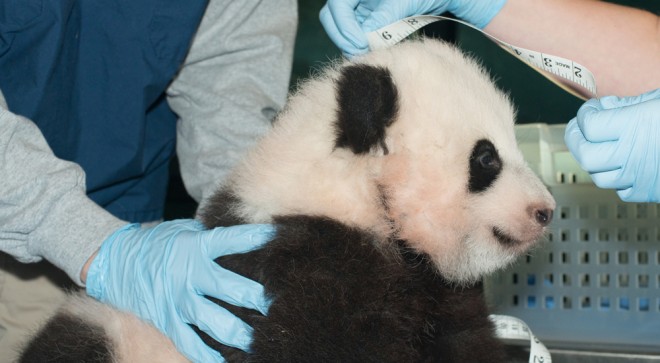
In this Nov. 29, 2013 photo provided by the Smithsonian National Zoo, a giant panda cub is measured as it is about to turn 100 days old, at the Smithsonian National Zoo in Washington. AP
WASHINGTON – Washington’s National Zoo named its giant panda cub Bao Bao on Sunday but fans will have to wait a month before they can get their first glimpse of the furry creature.
Bao Bao – “treasure” or “precious” in Mandarin – is only the second cub to survive birth at the zoo since it received a pair of giant pandas in 1972 following president Richard Nixon’s historic visit to China.
In line with Chinese tradition, the naming ceremony took place 100 days after the tiny female’s August 23 birthday.
Assistant US Secretary of State Kerri-Ann Jones and Chinese Ambassador Cui Tiankai unrolled two scrolls inscribed in both English and Chinese.
First Lady Michelle Obama hailed Bao Bao as a “symbol of the growing connection between our two countries” in a video message.
Cui, meanwhile, explained that the Chinese tradition of waiting 100 days before naming a cub “represents the wish that the baby… will live as long as 100 years.”
More than 123,000 people voted to pick a name on the zoo’s website.
The winner outdid Ling Hua (“darling, delicate flower”), Long Yun (“charming dragon”), Mulan (“legendary young woman” or “wood orchid”), and Zhen Bao (“treasure” or “valuable”).
Bao Bao wasn’t at the ceremony and won’t be making her debut until early January, officials said, as they pointed disappointed fans to the zoo’s webcam instead: nationalzoo.si.edu/animals/webcams/giant-panda.cfm)
Only about the size of a stick of butter at birth, Bao Bao weighed 10.8 pounds (4.9 kilograms) on November 22 and even reacted to noises, they added.
Bao Bao won’t be a Washington resident forever.
In four years, the newest member of the capital’s panda family will be sent to China and become part of a breeding program there.
Pandas are notoriously reluctant at reproducing when held in captivity.
Bao Bao’s mother Mei Xiang – who had five false pregnancies from 2007 to 2012 – gave birth to a stillborn twin cub on August 24.
She also had a female cub in September 2012 but it died six days later from liver damage due to underdeveloped lungs.
Her first cub, Tai Shan, was born in July 2005 as a result of artificial insemination. He now lives at the Bifengxia Panda Base in Ya’an, in Sichuan province.
Paternity tests determined that fellow panda Tian Tian is Bao Bao’s father, also through artificial insemination.
Fewer than 1,600 pandas remain in the wild, mainly in China’s Sichuan province, with a further 300 in captivity around the world.
But this summer was a busy one in the panda world, with births in Spain, Austria and Atlanta, Georgia. China also recorded the only double birth of the year.